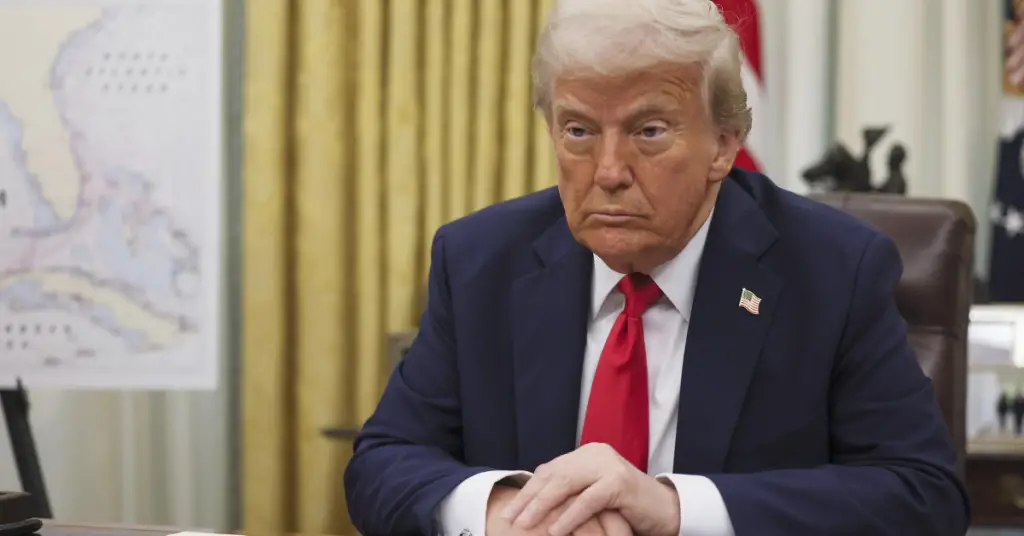The Senate voted on a resolution aimed at blocking President Donald Trump’s controversial global trade strategy known as “reciprocal tariffs.” The resolution, co-sponsored by Republican Senators Rand Paul (R-KY), Susan Collins (R-ME), and Lisa Murkowski (R-AK), gained the backing of several Democrats but ultimately fell short due to two key absences that left the measure one vote away from passing.
The resolution required a simple majority to pass. However, the votes of two senators who were expected to support the measure were unavailable: Senator Sheldon Whitehouse (D-RI), who was overseas on official business, and Senate Minority Leader Mitch McConnell (R-KY), who was reportedly absent due to illness. Without their votes, the resolution failed, underscoring that the political divide over Trump’s tariff policy remains deep-seated in both parties.
Despite the defeat, the vote’s sponsors—Senators Rand Paul and Ron Wyden (D-Ore.)—pushed for the vote as a symbolic move to challenge Trump’s global tariff plan. Paul, a consistent critic of protectionist trade policies, used a legislative procedure to force the vote, despite the fact that Republicans hold a 53-47 majority in the Senate.
Even if the resolution had passed in the Senate, it was expected to face strong resistance in the Republican-controlled House of Representatives, where recent votes showed little support for reversing Trump’s tariff authority. Additionally, the White House has made it clear that if the measure were to pass through both chambers of Congress, President Trump would likely veto it.
This failed resolution highlights the ongoing battle within the Republican Party over trade policy and the effectiveness of Trump’s tariff strategy. While some Republicans, including those sponsoring the resolution, have questioned the wisdom of reciprocal tariffs, others have remained staunch supporters of Trump’s approach. This divide among GOP members reflects broader disagreements on trade and foreign relations within the party.
The resolution’s failure also underscores the power of the Trump administration’s political machine, which has consistently defended the president’s tariff policies as essential tools for levelling the playing field in global trade.
The Trump administration has argued that these tariffs are necessary to counteract what it sees as unfair trade practices by foreign countries, particularly China. The administration claims that these tariffs will incentivise foreign governments to negotiate better trade deals with the U.S., and that the long-term benefits will outweigh the immediate economic challenges.
However, critics of Trump’s tariffs argue that the plan has hurt American consumers and businesses more than it has helped. Higher tariffs on imports from countries like China, Canada, and the European Union have led to increased prices on everyday products, which some businesses have passed on to consumers.
Farmers and manufacturers, particularly those who depend on global supply chains, have also felt the impact, with retaliatory tariffs imposed by foreign governments affecting their ability to sell products overseas. Despite this, the Trump administration has largely stood by its strategy, defending it as a necessary step in improving the U.S.’s economic standing on the world stage.
The failed Senate vote came after months of rising tensions between the executive branch and the legislative branch over trade policy. The Senate has repeatedly raised concerns over Trump’s approach, with several Republicans voicing their unease over the long-term consequences of the tariff scheme.
This division became especially apparent after Trump imposed tariffs on steel and aluminium imports in 2018, leading to retaliatory measures from countries like Canada and the European Union. The Senate has questioned whether these tariffs have hurt American businesses more than they have helped.
While Senate Republicans have generally supported Trump’s policies on many issues, including taxes and judicial appointments, trade has proven to be a more contentious topic within the party. Senators like Rand Paul, who has consistently advocated for free markets and minimal government intervention in trade, have been vocal in their opposition to Trump’s tariff-heavy approach. Paul’s co-sponsorship of the resolution reflected his belief that tariffs harm consumers and businesses in the U.S., ultimately leading to higher costs and reduced economic growth.
The push to block Trump’s tariffs mirrors similar efforts to rein in his authority over trade matters. Earlier this year, Congress passed a measure aimed at stopping Trump’s tariffs on Canadian steel and aluminium, with the hope that it would send a clear message to the White House about the need for more balanced trade policies.
However, even that effort was not without its challenges, as it garnered limited support from Republicans in both the House and Senate. The Trump administration has shown no signs of backing down on its tariff strategy, and many Republicans have opted to fall in line with the president, fearing political backlash for opposing a key component of his economic agenda.

Despite the political division, the fight over Trump’s tariffs is unlikely to end with the Senate vote. The administration has claimed that it is making progress on negotiations with several countries, including China, Canada, and the European Union, to reach new trade deals that could ultimately remove or reduce the tariffs.
However, the specifics of these negotiations have remained vague, with Trump officials refusing to disclose key details. As of now, it is unclear when or if these agreements will be implemented, leaving many businesses and industries in a state of uncertainty.
Senators Paul and Wyden, along with other opponents of Trump’s tariff policies, have indicated that they will continue to push for resolutions that challenge the president’s authority on trade. They view these votes as a crucial means of building political pressure on the White House and pushing for more balanced, less confrontational trade policies.
They hope that these efforts will ultimately lead to a more rational approach to trade and global relations, one that protects American workers and businesses without causing undue harm to the economy.
While the immediate defeat of the resolution is a setback for those seeking to rein in Trump’s tariff policies, it is clear that the issue of trade will continue to be a central point of contention between the executive branch and Congress.
The ongoing debate over tariffs underscores a larger ideological divide within the Republican Party and American politics as a whole. Some believe that protectionist policies are necessary to ensure the country’s long-term economic security. In contrast, others argue that free trade and global cooperation are the keys to a prosperous future.
As the battle over Trump’s tariffs rages on, it remains to be seen whether the president’s approach will ultimately succeed or whether Congress will be able to rein in his trade authority. With the 2024 elections on the horizon, the political ramifications of the tariff fight could have significant consequences for both the Republican Party and the broader political landscape.
Disclaimer: This article has been meticulously fact-checked by our team to ensure accuracy and uphold transparency. We strive to deliver trustworthy and dependable content to our readers.




